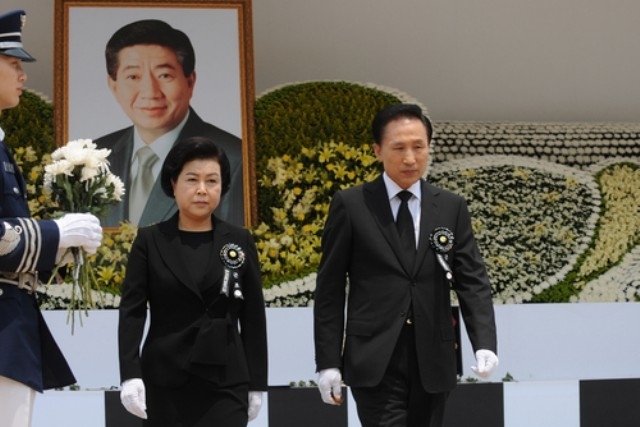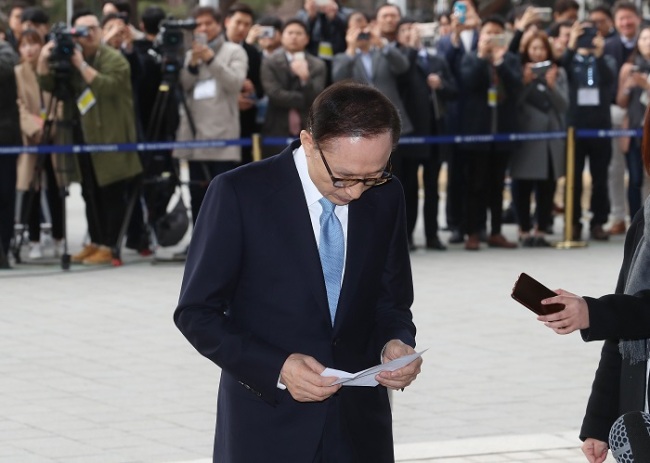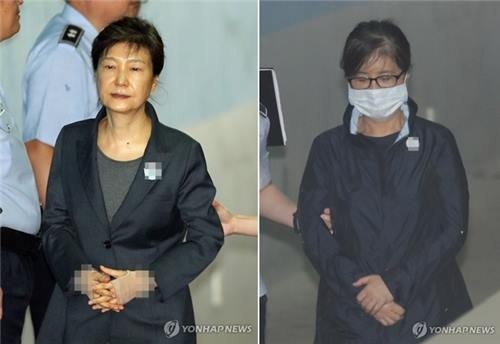When ex-President Roh Moo-hyun took his own life in 2009, many blamed the country’s then-President Lee Myung-bak for the death of his predecessor.
Roh, who was in office from 2003-2008, was alleged to have received $6 million from a businessman while in office. Formerly a human-rights lawyer who fought against authoritarian regimes and corrupt politics, the allegations severely damaged Roh’s “clean” image.
About a month before his death, Roh was grilled for more than 10 hours by prosecutors. At the time of his death, he had been scheduled to appear for a second round of questioning by the prosecution the following week.
 |
| Former President Lee Myung-bak (far right) and his wife Kim Yoon-ok (left to Lee) attend the funeral of late President Roh Moo-hyun (his picture framed in the back) on May 29, 2009. (Yonhap) |
Tens and thousands of mourners traveled to Bongha, a small rural town in South Gyeongsang Province where Roh lived after retirement, to pay their respects. All of a sudden, it seemed as if the corruption allegations against Roh and his family members never mattered.
Shortly after, 100 academics and cultural figures, including Catholic priest Ham Se-woong and then-Seoul National University professor Kim Se-kyun, publicly demanded that President Lee Myung-bak apologize for the “politically motivated” investigation, which they claimed was responsible for Roh’s death.
About nine years later, former President Lee Myung-bak seems to be in late Roh’s shoes.
Lee, who was summoned by the prosecution on Wednesday over some 20 charges, including multiple cases of bribery totaling millions of dollars, has argued that the ongoing investigation is “political revenge” against him by the current government, specifically for Roh’s death.
 |
| Former President Lee Myung-bak stands in the photo line at the Seoul Central District Prosecutors’ Office early in the morning for questioning Wednesday. (Yonhap) |
In other words, Lee is repeating what Roh’s supporters claimed nine years ago — that the ongoing investigation is a “politically motivated” one.
Current liberal President Moon Jae-in was one of Roh’s closest aides and served as the ex-president’s lawyer when he was being investigated on corruption charges.
Until last year, Lee seemed to be leading a comfortable retirement as a fellow conservative, ousted ex-President Park Geun-hye, had succeeded him.
Indeed, there seems to be a pattern of former Korean presidents ending up in prison, or becoming a subject of criminal investigation, once their time in office is over and power is taken over by the rival party.
Some experts say what former President Lee characterized as “political revenge” is almost inevitable under the current political structure.
“I’m not saying Lee is innocent and all the accusations against him are false,” said political science professor Lee Chung-hee at Hankuk University of Foreign Studies.
He defined Korea’s current presidential system as an “imperial presidency,” where the president is almost as powerful as a monarch.
“But in the current structure, where all the power goes to the president and his or her control often exceeds the constitutional limits, corruption involving his or her aides or family members are inevitable. Most media and conglomerates are also very favorable toward the president only during his or her time in office. Once the power shifts, everything changes.”
Indeed, most investigations against former presidents in South Korea usually involved their closest aides or family members.
In the case of the late Roh, his brother Roh Gun-Pyeong, was indicted on the suspicion of influence peddling, while former first lady Kwon Yang-sook was also summoned for allegedly receiving a bribe from a businessman.
Lee, who is alleged to have committed multiple illicit deeds himself, including accumulating slush funds and being involved in stock price manipulation, also has his aides and family members facing possible investigation.
His wife, Kim Yoon-ok, was recently alleged to have illicitly spent millions of dollars overseas while being engaged in a government-funded project to promote Korean cuisine, among others.
A number of his former aides, including Lee Byung-mo and Kim Paik-joon, have been arrested as part of the probe. The homes of his brother have also been raided.
Ousted former President Park repeatedly emphasized that unlike most politicians, she has “no husband, parents nor children” to take care of, and that this made her an ideal candidate who could fully concentrate on state affairs.
But her relationship with Choi Soon-sil, her longtime confidante and secret “adviser” who was later charged for corruption and influence-peddling, played a large role in Park’s impeachment.
 |
| The now-ousted ex-President Park Geun-hye (left) and her friend and “advisor” Choi Soon-sil (right). (Yonhap) |
Experts point out that the current South Korean Constitution does not grant adequate division of power, which makes the head of state — and those around him or her — vulnerable to corruption. The current system lacks “proper mechanisms to check and balance” state leaders, according to a study by the Stockholm-based Institute for Security and Development Policy.
“Deficits include the tendency of the president to control the National Assembly through the authoritarian party system; the lack of a fully impartial judiciary with its appointees nominated by the president; the inefficacy of congressional investigative powers as well as that of the prosecutor; and the lack of properly functioning Board of Audit and Inspection,” said researcher Kim Seon-hwa in the ISDP study.
Chae Jin-won, a professor at Humanitas College of Kyung Hee University, said the decentralization of powers — the dispersion of presidential powers and of the central government — could end this pattern of ex-presidents’ fall from grace.
“What we need is transparency and a system that consistently monitors the power (of the president),” Chae told The Korea Herald. “Ultimately — and somewhat ironically — this seems to be the only way for South Korean presidents to keep themselves safe from future criminal investigations once their terms are over.”
Meanwhile, some say former President Lee’s claims of political revenge are groundless, regardless of the structure of the Korean presidency.
Park Sang-byung, a political commentator, said that in order for Lee to claim that the ongoing probe is political revenge, all allegations against him first need to be proven false.
“But there are already so much evidence that Lee had been involved in many illicit affairs during his tenure,” Park told The Korea Herald. “There was no way that he was going to avoid questioning by the prosecution.
“By claiming that this is political revenge, Lee is only trying to seek the attention of his supporters, while finding a convenient excuse to deny the allegations,” he added.
By Claire Lee (dyc@heraldcorp.com)

